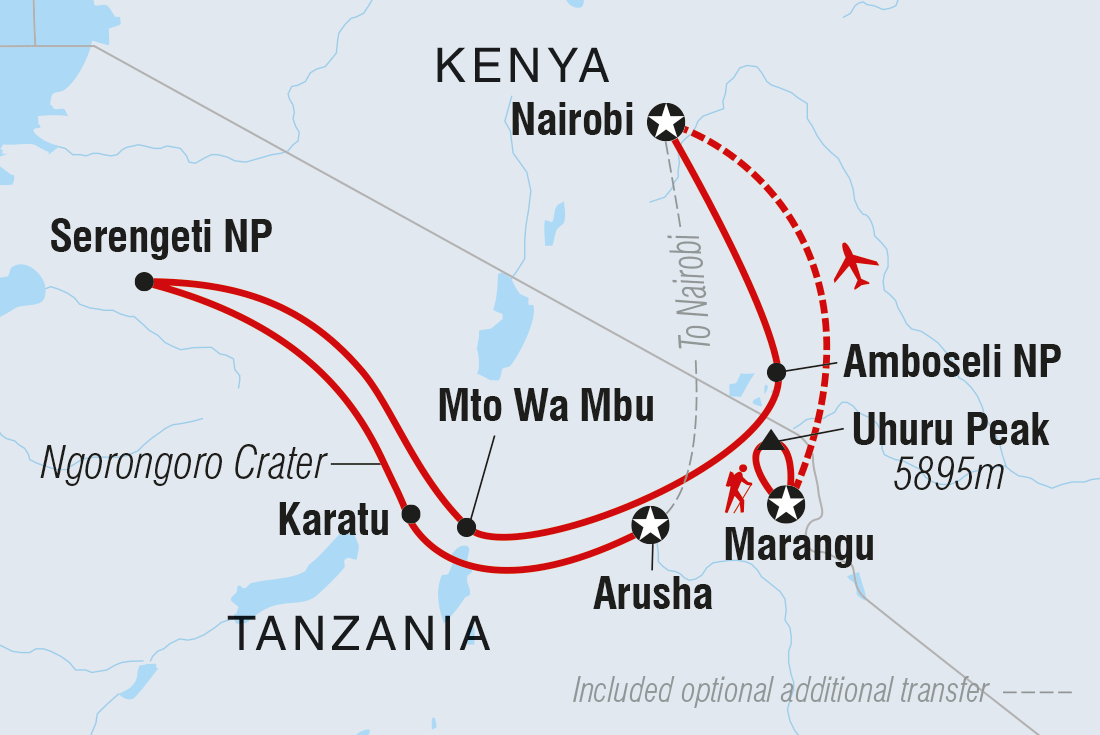
Experience two of Africa's most famous natural wonders from ground level on this trip, designed for those with a passion for the outdoors. The imposing peaks of Mt Kilimanjaro inspire awe and rouse a spirit of adventure, while the vast plains of the Serengeti evoke a sense of wonder and deep respect for the animal kingdom. Rise to the challenge and conquer Africa's highest peak on a difficult trek to the summit of Mt Kilimanjaro. Safari through the savanna in search of stealthy predators, then spot other game in the gigantic Ngorongoro Crater. This is a journey that will reward those with an appetite for excitement and an appreciation for nature, so get ready for thrills, challenges and discovery.
- Explore the Serengeti National Park in depth with four game drives – two early-morning and two late-afternoon – through this spectacular wildlife arena.
- Take a mind-blowing safari across the floor of the Ngorongoro Crater in an open-roof 4WD for a chance to see the endangered black rhinoceros.
- Kill it on your Kili trek with the best local team, nights spent in huts instead of tents and an extra acclimatisation day at Horombo for the best chance at summiting.
- Hike Mt Kilimanjaro's climactic last stretch by lamplight and give yourself as much chance as possible to watch a sunrise over icefields from behind Africa’s highest peak.
- We’re an official partner with the Kilimanjaro Porters Assistance Project. Hike easier knowing that while our porters are taking care of you, someone is looking out for them.
- Explore the Serengeti National Park in depth with four game drives – two early morning and two late afternoon – then explore Amboseli National Park, home to the largest population of African elephants in Kenya.
- Accommodation on this trip is mainly in two-person canvas dome tents with camping mattresses supplied.
- The type and variety of accommodation are determined by conditions on each of our routes. Each route is different - on some, we use a mixture of campsites and wild camps; on others, we also use hotels. In Africa, it's not usually practical to camp when staying in towns and cities, so we use hotel accommodations and eat out in local restaurants.
- There may be the occasional night stop when we stay on the grounds of a hotel or at a campsite, which may also have rooms/cabins available. In this case, there may be a choice of camping or upgrading to a room. Rooms cost approximately USD 40-100 per room per night for a twin room and cannot be pre-booked. Standards of these rooms vary greatly, and we recommend viewing the room before purchasing the night's accommodation. The day-by-day itinerary advises when upgrades may be possible (subject to availability).
- Keep in mind that if we are staying in dormitory accommodation, you may have to share with other passengers or be split into same-sex rooms.
- Campsites do have facilities, but they usually aren't to the same standard you would find in Western countries. For example, the bathroom facilities can be very basic. Toilet paper is rarely provided, and shower facilities can be as simple as a hose pipe spurting out cold water. Wild camps have no facilities at all.
- At times, there may be spare tents in the vehicles. Unfortunately, these cannot be used without the purchase of a single supplement. This is to ensure the tents avoid wear and tear or are clean and ready for the customers arriving on the next section of the trip.
- On the mountain you'll be staying in basic but comfortable wooden A-frame huts with single beds and simple mattresses. The huts are 4, 6 and 12 share depending on where you are on the mountain. Due to limited accommodation on the mountain, you may need to share a hut with non-Intrepid passengers and/or members of the opposite sex. There are also washroom huts with western & drop toilets and basins.